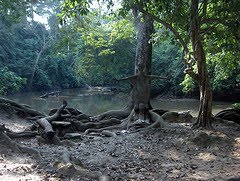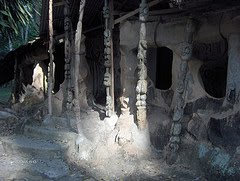Sunday
50 event that Nigerian will always remember
50 events that shaped Nigeria's history
October 1, 1960 – Nigeria gains
independence from Britain, with Abubakar Tafawa Balewa as the Prime
Minister leading a coalition government of parliamentary system.
October 1, 1963 - Nigeria becomes a republic, breaking away from the British monarchy.
January 15, 1966 – Fall of the First
Republic, as Prime Minister Tafawa Balewa is killed in unsuccessful
coup led by some Majors.
January 16, 1966 – Johnson Aguiyi-Ironsi takes over as the nation’s Head of State.
July 29, 1966 – Aguiyi Ironsi killed in
a counter-coup by a group of northern army officers who revolted
against the government, and he is replaced by Yakubu Gowon.
January 5, 1967 – Military leaders and
senior police officials of each region (East, North and South) sign an
accord in Aburi, Ghana and agree on a loose confederation of regions.
May 30, 1967 – Chukwuemeka Odumegwu
Ojukwu, the Eastern Region’s military governor, announces the
break-away of the eastern states as the Republic of Biafra, sparking
bloody civil war that led to the deaths over a million people.
January 12, 1970 - Biafran leaders
surrender, as the officer administering the government, Phillip Effiong
calls for a cease-fire. The region was reintegrated into Nigeria.
July 25, 1975 – Yakubu Gowon overthrown in a coup led by Murtala Ramat Mohammed, while attending the OAU summit in Uganda
February 13, 1976 – Murtala Mohammed assassinated in a failed coup attempt. His deputy, Olusegun Obasanjo, takes over
September 21, 1978 – A new
constitution, styled on American presidential system, published, and
the ban on political activity lifted.
1979 - Nation heads to the polls for a general election which saw the election of Shehu Shagari as the democratic president.
January 1983 – Government expels more
than one million foreigners, mostly Ghanaians, saying they had
overstayed their visas and taking jobs from Nigerians.
August, September 1983 – Shehu Shagari re-elected as the president, amid accusations of irregularities and corruption.
December 31, 1983 – Muhammad Buhari
heads military officers who seize power in bloodless coup, to be become
Commander in Command and Head of State.
August 27, 1985 - Ibrahim Babangida seizes power in bloodless coup, curtails political activity.
1986 – Babangida launches controversial Structural Adjustment Program (SAP) which shook up the nation’s economy
October 19, 1986 – Foremost journalist, Dele Giwa, assassinated by a parcel bomb which is often blamed on the Babaginda regime
April 22, 1990 – Gideon Orka leads coup to topple Babaginda, but the coup is unsuccessful.
December 12, 1991 – Nigeria’s capital city moved from Lagos to Abuja
June 12, 1993 – Babangida annuls the presidential elections adjudged to have been won by businessman, Moshood Abiola.
August 27 1993 – Babangida transfers
power to Interim National Government led by Ernest Shonekan, following
massive protest against his administration
November 17, 1993 – Sani Abacha seizes power from the Interim National Government and suppresses opposition.
1994 – Acclaimed winner of the June 12 election, MKO Abiola, arrested after proclaiming himself president.
November 10, 1995 – Ken Saro-Wiwa,
writer and campaigner against the oil industry damage to his Ogoni
homeland, executed following a hasty trial. In protest, the US and
European Union impose sanctions on Nigeria
June 8, 1998 – Abacha passes away under controversial circumstances and succeeded by Abdulsalami Abubakar.
July 7, 1998 - Abiola dies in custody days after meeting a US delegation
1999 – Parliamentary and presidential elections lead to the election of Olusegun Obasanjo as the nation’s president.
2000 – Adoption of Sharia law by several northern states in the face of opposition from Christians
2001 – Tribal war in Benue State,
displacing thousands of people, as soldiers sent to quash the fighting
kill more than 200 unarmed civilians, apparently in retaliation for the
abduction and murder of 19 soldiers.
November 2002 – Many lives lost in four
days of protest stoked by fury from Northern Nigeria over the planned
Miss World beauty pageant in Abuja
July 10, 2003 – Governor of Anambra
State, Chris Ngige, abducted by a team of police officials and forced
to sign his resignation letter, which was upheld by the State’s House
of Assembly but over-turned by the Supreme Court.
September 27, 2003 – Nigeria’s first satellite, NigeriaSat-1 launched via Russian rocket into the space.
May 18, 2004 – State of emergency
declared in Plateau State, after more than 200 people are killed in
Yelwa in what would result in tit-for-tat killings by Muslims and
Christians in the state
January 2005 – Inspector General of
Police, Tafa Balogun, forced to resign from office on corruption
charges and subsequently tried and jailed by a court of law.
July 2005 – Paris Club of rich lenders agrees to write off two-thirds of Nigeria’s $30 billion debt.
January 9, 2006 – Militants in the
Niger Delta commence major attack on pipelines and other oil
facilities, and kidnap foreign oil workers for ransom, as they demand
more control over the region’s oil wealth.
April 2006 – With record oil prices, Nigeria becomes first African nation to pay off its debt to the Paris Club of rich lenders.
May 17, 2006 – Senate rejects proposed
changes to the constitution which would have allowed the President to
stand for a third term in 2007.
August 6, 2006 – Nigeria cedes
sovereignty over the disputed Bakassi peninsula to neighbouring
Cameroon under the terms of a 2002 International Court of Justice
ruling.
October29, 2006 – Sultan of Sokoto and
tens of others die in a plane crash, the country’s third major civilian
air disaster in the year.
August 14, 2008 – Nigeria finally hands over the Bakassi peninsula to Cameroon, ending a long-standing dispute.
May 2009 – Niger Delta militant group,
MEND, rejects government offer of amnesty and declares offensive
against Nigerian military.
August 2009 – Two-month offer of a
government amnesty for Niger Delta militants comes into force, as
thousands of militants drop their arms.
November 23, 2009 – President Yar’Adua
travels to Saudi Arabia to be treated for a heart condition. His
extended absence triggers a constitutional crisis and leads to calls
for him to step down.
February 10, 2010 – National Assembly
votes to transfer power to the Vice-President, Goodluck Jonathan, until
Mr Yar’Adua is able to resume presidency. Mr Yar’Adua returns to
Nigeria but does not return to work.
May 6, 2010 – Umaru Yar’Adua dies after
a long illness. His vice-president, Goodluck Jonathan, already acting
in Yar’Adua’s stead, succeeds him.
Friday
Nigeria independence mark 50 years of no security
Nigeria celebrate 50 years of Independence from their colonial master (The British). A country that now comprise of 36 states, 521 languages, 250 ethnics groups, 3 religion, 180 major festival and 9200 castles.
Nigerian has nothing to celebrate for because of lack of social amenity, good leaders, security, food, water, health, education, electricity, good road and job creation. etc
Meanwhile, we still have the cause to celebrate despite of our pain, troubles, tribes and religion fighting. I must confess that Nigerian are the most happiness people around the world...A day will come that Nigerian will be set free from bad and corruption leaders who tend to enslave the people so that they can enrich themselves.
I have a question?
What about if the colonial master did not come to Nigeria?
Wound Nigeria could have be grate now?
Who are the beneficiary of Nigeria economy? ; if Nigeria fail as a nation state?
We should not forget today as we celebrate Nigeria 50 years Independence that on this day
that bomb went off not far from eagle square, where president Goodluck Jonathan and he's Vice Namadi Sambo and Nigerian most prestigious people and foreign invited guest had gathered for the official celebrations, at least eight people have been killed in explosions site.
In conclusion , Nigeria as a nation will only develop if only we all work together as a citizen and believe in one another because we have no other country to go to...Let live in peace and harmony...together we stand ; divided we fall..let forget tribalism and religion crisis. Let the government of Nigeria remember that God Almighty will surely judges them all...
Stay bless and Long live Nigerian
Subscribe to:
Posts (Atom)










